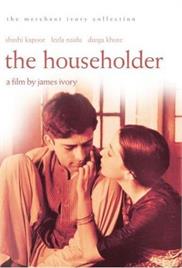Be Careful of Fake Websites. Always use HindiMovies.to domain & Join our Telegram Channel for Latest Updates.

Likes: 0
Views: 2.87K
A young Indian newlywed finds his independent wife troublesome and seeks help and advice from his overbearing mother, a supposedly worldly wise friend, an American seeker of enlightenment and a swami.
Duration: 100 min
Released: 1966
IMDb Rating: 6.9/10 (241 Votes)
Genre: Comedy, Drama, Hindi Movies
Stars: Shashi Kapoor, Achala Sachdev, Durga Khote, Leela Naidu
Directors: James Ivory
Writers: Ruth Prawer Jhabvala
Year: 1963
Server 1 – Youtube
Server 2 – Nowvideo
Server 3 – Videoweed
Server 4 – Movshare
Server 5 – Cloudtime
The Householder (1963): A Tender Exploration of Marriage and Life's New Beginnings
Introduction
The 1963 Bollywood film The Householder stands as an exquisite example of Indian cinema's delicate foray into the slice-of-life genre blended with comedic and dramatic elements. Directed by James Ivory, a key figure of the famed Merchant Ivory Productions, and co-written by Ruth Prawer Jhabvala and Ivory himself, this film marks one of the pioneering collaborations that introduced audiences to a new kind of Indian storytelling on screen. The movie, rich in subtle humor and emotional sincerity, examines the nuances of young married life and the challenges faced by a man learning to embrace the responsibilities of being a husband and a provider.
Plot Overview
The Householder centers on Prem Sagar, a young man portrayed with warmth and natural charm by Shashi Kapoor, who is embarking upon his new life as a householder following his marriage to Indu, played by the graceful Leela Naidu. Prem takes a job as a college teacher — a position that brings him both pride and uncertainty — and navigates the complexities of balancing his professional responsibilities with his personal life.
The film’s storyline delicately unfolds the emotional and psychological growth Prem undergoes as he attempts to understand his role within the family and his marriage. He grapples with insecurities, societal expectations, and his desire to fulfill his duties well, often finding himself in humorous and awkward situations that reveal the human side of adjusting to life's new roles. Meanwhile, Indu stands as a supportive yet keen character whose own hopes and fears mirror the quiet struggles of many newlyweds.
Director James Ivory lends the story a gentle pacing and attention to small but meaningful moments, avoiding melodrama and instead highlighting everyday life’s subtle tensions and joys. The screenplay beautifully captures the essence of middle-class Indian life during that era, offering insights into cultural norms and the evolving concept of marriage and domesticity.
Main Cast and Performances
Both actors' chemistry adds an authentic layer to the film’s portrayal of marital dynamics, underscoring the hopes, misunderstandings, and eventual harmony typical of newlyweds.
Direction and Writing
James Ivory’s direction is characterized by subtlety and sympathy. He eschews dramatic excess, choosing to highlight conversations, looks, and everyday situations that build a portrait of Prem’s maturation. This restrained style allows the emotions to emerge organically, engaging viewers in a more intimate cinematic experience.
The screenplay, co-written by Ruth Prawer Jhabvala and James Ivory, is a feature worth noting. Jhabvala, an acclaimed writer known for her keen observations of Indian society, brings literary finesse to the narrative, weaving in the themes of marital adjustment, family expectations, and individual growth with delicate balance. Their collaboration molds a story that is both culturally poignant and universally accessible.
Music and Songs
The film’s soundtrack, composed by Ustad Vilayat Khan, one of the most revered sitar players in Indian classical music, enriches the film's emotional landscape. The music complements the narrative's gentle and introspective tone rather than overpowering it.
While The Householder does not follow the typical Bollywood pattern of songs integrated into the story, the classical compositions provide an atmospheric background enhancing the movie’s mood. These tunes subtly underscore the cultural setting and the characters’ inner states without distracting from the story.
Cultural and Cinematic Significance
The Householder is often regarded as a landmark film for its realistic depiction of Indian middle-class life and its pioneering role in international cinema collaborations. It was among the early films that introduced Western audiences to Indian domestic stories beyond mythology and grandeur, focusing instead on relatable human drama.
The film also marks a significant milestone in Shashi Kapoor’s career, heralding his emergence as a leading actor capable of depth and versatility. Moreover, it heralded the fruitful partnership of Ivory, Jhabvala, and producer Ismail Merchant, who would go on to create numerous critically acclaimed films drawing on Indian themes.
Conclusion
In sum, The Householder (1963) is a beautifully crafted film that explores the themes of marriage, personal growth, and familial responsibility with honesty and warmth. Anchored by memorable performances from Shashi Kapoor and Leela Naidu, supplemented by James Ivory's sensitive direction and a thoughtful screenplay, the film remains a touchstone for those interested in nuanced portrayals of Indian life and early international collaborations in cinema.
Whether you are a devotee of classic Bollywood cinema or a newcomer eager to explore the roots of cross-cultural filmmaking, The Householder offers a resonant and enduring cinematic experience worth appreciating and revisiting.